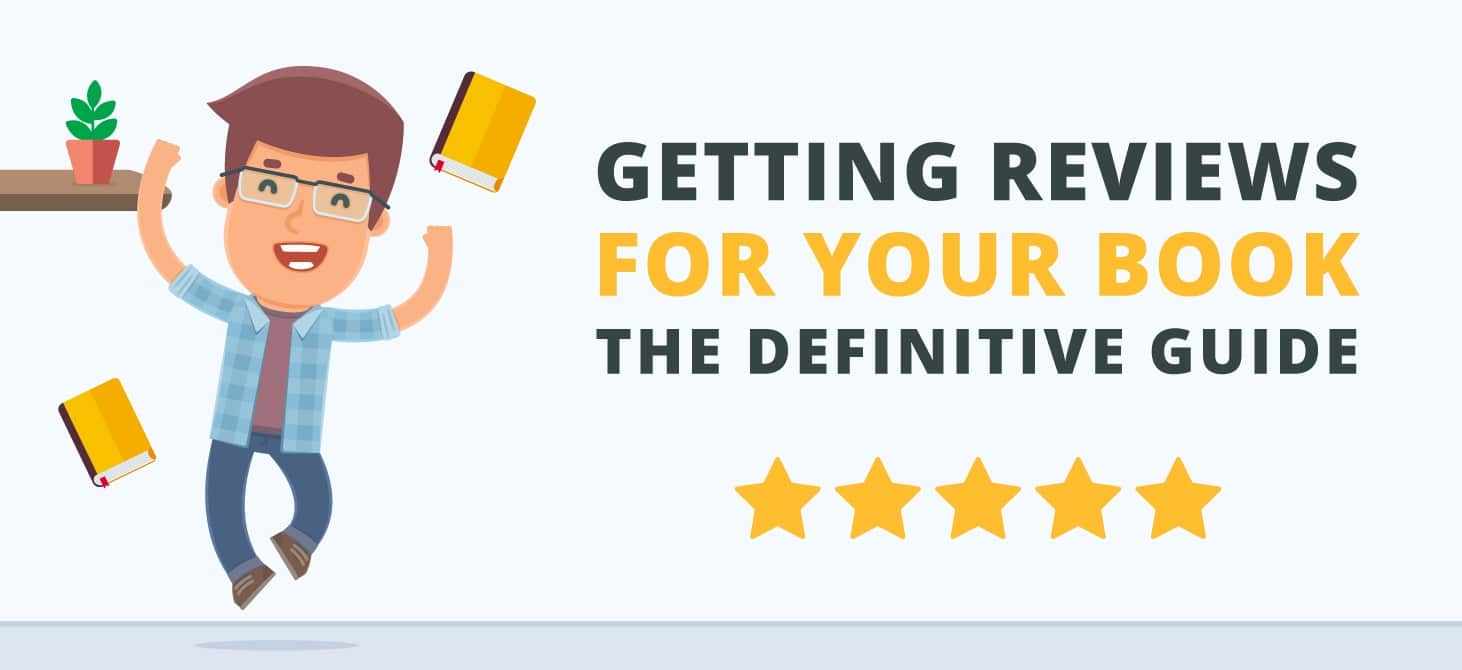

Warning - This Post is Long!!
In it, I've tried to condense all that I know about getting reviews for your book. If you can't read it all right now, scroll to the bottom of the page and you'll be able to download a PDF version of it 🙂
Ahhh... reviews. One of the most dreaded elements of the whole process...
"Should I only read my good reviews"? - said the worried writer. "I won't read my bad reviews" - said the anxious writer. "Reviews are not that important after all" - said the inexperienced writer.
Actually, they are. And they are so much more than just vanity metrics. They are essential to your book page and to you marketing in general.
In this article, we’ll discuss exactly that: how you can leverage reviews to promote your book and how you can generate these reviews. We’ll also reveal some guidelines which will be especially helpful for those just starting out.
Why Get Reviews? Are They All That Important?
Better Sales
Having good reviews for your book can almost act like a vouch of confidence for your work. According to a study done in 2006 on online recommendations, sociologists have found that reviews do have causal and even positive impacts on the sale of products. In other words, books with more positive reviews, do sell better.
Source of Feedback
In addition to acting as a form of social proof for your work, reviews (both positive and negative) provide the author with an excellent chance to have their book evaluated. Needless to say, everyone likes good feedback (good for the ego after all), but sometimes, there is a place for meaningful critique. Constructive critique can help you grow in your craft and mold your future approach to your work.
When you look at the reviews you get, pay special attention to the mid-list ones, namely the 2 and 3 star reviews. Usually, they include the best feedback you can use to improve various aspects of your book (cover, editing, etc.). Don't worry to much about 1 star reviews: there are many 'trolls' out there, and these reviews are usually not very constructive. Plus, getting a 1 star is considered a 'right of passage' from being an amateur to entering the pro level of your career 🙂
It Helps Your Book Rank Better In Amazon’s Algorithm
...or does it? I mean: can reviews alone help you rank better in Amazon, so you can reach more readers?
As with any insanely complex algorithm, there is a myriad of factors that are computed into the infamous ''A9" (that's what it's called). Here are some of the other ranking factors that Amazon itself covers in its documentation:
- Price point – When compared to its competitors in the same category, your book must be "priced well in such a way that it gives more profit." For more tips on pricing, see this article by the Alliance of Independent Authors.
- Title and subtitle – Does your book have strong keywords in its title or even subtitle to help the algorithm categorise it clearly and easily? If you need help with coming up with your keywords, check out KDP Rocket.
- CTR (Click Through Rate) – It's the number of clicks your book receives in the listings divided by the time it's shown on Amazon.
- Sales in the Last 24 Hours – In comparison to other similar books in your category, how many sales has your masterpiece made in the last 24 hours?
But most importantly...
Number of Verified Reviews, Helpful Reviews and New Reviews (less than a month old) – The number of reviews will help with your book’s ranking on Amazon. Do note that unverified reviews are not taken into consideration in this case. However, they do help as social proof and do encourage Amazon customers to click through to your product listing (which can then help with ranking, as per the Click Through Rate point above).
Amazon Verified Purchase Reviews Vs Generic Reviews
If you want, as a customer, you can review any product on Amazon, even if you haven't actually bought it. But if you have, your review will be marked as a 'Verified Purchase'. Understandably, Amazon gives more significance to the latter: they obviously prioritise people who have actually bought the item, over those who may just be fooling around leaving fake reviews.
However, you should never dismiss 'unverified' reviews. After all, they do add up to your total count, and very few people are going to notice the difference (having a higher number of reviews is beneficial
Can I Pay For Book Reviews? Should I?
This is quite a difficult question to answer. So, let's turn to Amazon's own Terms and Conditions and see what they say about this:
... so, in essence, NO - YOU SHOULDN'T. However, some people who are extremely clever (much more than me), came up with intelligent and - most importantly - LEGAL ways of getting you more reviews for your book. Ways that actually comply with Amazon's rules and don't cause your account to be shut down.
For some recommendations on which book review service to choose, scroll to the bottom of the post.
How To Get Reviews For Your Book: A Framework
Develop a List as Early as Possible
Building connections from the get-go is crucial. The problem with waiting until the last moment is that you'll always be rushing to get things moving in terms of marketing, and unfortunately more often than not this means settling for lower quality.
Whenever you make contact with a potential reader/customer (be it in real life (!) or through your personal blog), ask to add them to your list either personally or through opt-in forms on your website. While you can communicate with your readers on social media too, there is nothing that comes close to owning your own email list. This gives you direct contact with these readers, whom you can ask for a review when the time comes.
If you need a primer on list building for authors, check out Kirsten Oliphant's book: Email Lists Made Easy for Writers and Bloggers. It's one of the best I read on the subject.
Promotional Links in Free Ebooks
If you already give out freebies on your website in exchange for your reader's email, this is an excellent way to leverage that to get more reviewers. Include a link in the back of your ebook or even within it with a simple review request. It's a lot easier for people to click on a link than for them to go to your Amazon page themselves, and it can still be just as effective.

Pro Tip
Don't just include a generic link pointing to your book's page. Use a specific link that takes them to your book's review page, where they can start typing directly without having to scroll to the bottom.
Use this link and replace the ASIN number at the end with your book's own:
Use Book Bloggers
Here are some people you’ll surely want on your side: bloggers. Bloggers are known for having built strong relationships with their own pool of readers and other fellow book bloggers. The only problem is that there is an increasing demand to have books reviewed. You may be wise to cultivate relationships with bloggers early on by engaging with them and their community, or by asking and responding to questions on topics of importance to your genre.
Here's a step-by-step plan to get you on book bloggers' radars.
- Start small and first make a list of bloggers that match your genre. You can start by looking at the lists created by Derek Murphy. Click here for fiction and here for non-fiction.
- Ensure that you follow any submission guidelines and policies given by these book bloggers. You want to stay on their good side after all.
- When you submit a pitch, talk just a little about who you are and what you’re offering for a review. Have you ever submitted a query letter? This is a little bit like that. Provide the blogger with basic information about your book like the title, genre, number of pages, and a short summary. It also helps to tell them if it’s in print or as an ebook, the publisher and what the release date is. As an author, a website helps you a lot too for various reasons, but send it along as well.
- Before you send out that email pitch though, make sure you personalize it! Take a look at other books they’ve reviewed and be sure they specialize in what you’re pitching. Use their name too in order to make it more personal, and if you’re an active member of their community, mention that too.
- Keep track of their turnaround times and reviewing style as well, along with their “to be read” lists. Take a look at where their reviews are usually posted.
- Check the site's traffic too! You can do this by looking at their Alexa rank, with a lower number being better. Combine this with their social media traffic and shares or comments to see a general estimate of how many people might learn about your book. Don't just pick blogs that are more popular though; just because a website is more popular doesn't mean it can influence its readers as well. It might even be harder to obtain a review from those sites anyway!
- Last but not least, thank everyone for the time they take to review your book. This isn't only a common courtesy, but an excellent way to keep your contacts! Next time you need to contact them, you'll know that you're on good terms.
Social Media
Publishing gurus have been skeptical about social media lately. Does it actually help you sell books? Short answer is: no, not really. Ever heard of a huge launch where Twitter played a big part in getting downloads? No, I didn't think so. But think of social as another piece of the puzzle, every little brick helps in creating your author platform. Some of your readers might want to use this channel to communicate with you, so why not give them the chance? After all, setting up accounts with the different networks is so easy these days... (and so is scheduling posts).
Book Giveaways
Who doesn't love a free good book? Organize an interesting giveaway to get more attention and entice your book giveaway winners to return the favor by giving you some feedback. Often times, it'd be wise to run your giveaway together with other events or promotions such as a blog tour where you can leverage the attention the event is already getting. Promote your giveaway on social media too, or you can always go on giveaway sites to list your book giveaway.
Author’s Note At The End Of Your Book
It’s common to include an author’s note at the end of your book. It doesn’t have to be excessive, though. All you have to do is thank your reader and encourage them to leave a review on Amazon. You’ll be surprised by an explicit call to action like this can sometimes be very effective. Try to make your note personal and also, express that you hope your reader has enjoyed this journey with you (see above).
Get To Know Other Authors
Since you're in the same niche, what better way than to leverage other authors' current audience? Authors often work together to help promote one another to their own readers. If a fellow author likes your work and leaves a review, it can be a very powerful and effective statement. Be sure to return the favor in the future if the author requires a fellow author to read and review his or her book!
A Step By Step Guide If You Have No Ready Audience/List
While focusing on the content of your book is imperative, it is also wise to start the marketing process at least two months before the book is launched.
It would be dreadful to finally finish your masterpiece and then start running around thinking of ways in which you could advertise and push other people to read it... 🙁
So, if you have zero or a very small audience/list, here are some steps to help guide you. Bear in mind that it’s important to create a spreadsheet so you can track who you’ve contacted or who you’d like to contact.
DO NOT ask your family and friends for reviews!
Yeah, you read that right. And yeah, I know it's probably the easiest source for ramping your number up in a short time.
Indie author Chris Fox was the first to explain how asking your acquaintances for reviews can hurt you in the long run, and make the Amazon algo work against you. Here's Chris explaining his tactic:
Find book reviewers who have reviewed similar genre books
Start small by finding books similar to yours. It’s pretty easy to do this on Amazon, since you can go right to the “Customers Who Bought This Item Also Bought” section to see books just like yours.
Now that you’ve found a similar book, click on its reviewers. Click the button that lets you see all the reviews, and look at the “most helpful” and “all positive” reviews. This will show you experienced reviewers who look at products every week, and who are more likely to write a review if they read your book. Click on the names of the reviewers next to see if they provided an email address on their profile page. Find about 100 of these email addresses in your genre and connect with those people.

Remember: Make Sure You Do This RIGHT!
Write out a personalised email instead of copying and pasting an impersonal one. Always start out with where you read their review, why you're reaching out, and request if they can write a review for you in exchange for a free copy of your book. Flatter them by acknowledging their expertise in the genre, but please, don't be cheesy. Also, ask for their opinions and feedback. Try to seek out reviewers who have made recent comments or reviews, so you know that they're still active.
You’ll probably get 20-30 people out of those 100 responding to you, so send your book along to those who are interested. You can send it in EPUB, MOBI, or PDF as ask for a review in maybe two weeks. One great option to do this is to use BookFunnel (it's really good).
Then, send a polite follow up a week later to remind them. Even if you only get 10-20 reviews from this process, that’s the start you need to lead into more!
Announce the Book on its Launch Day
Send an e-mail to your list (or the contacts in your spreadsheet) and let them know when your book will be officially launched, nicely asking them to provide you with any feedback. Another important piece of advice is to schedule the e-mail to go out as early as possible (6 or 7 am) so there’s a higher likelihood that it will be one of the first things they see in their inbox.
Follow Up With Each Reviewer
If you’ve followed the above steps and have already started receiving reviews/feedback, don’t forget to send back a personal e-mail instead of a generic one. A stronger bond with your reader will ensure a loyal fan base.
When it comes to getting more reviews, it does take a lot of work, but try experimenting with the different strategies that are available to you. You’ll want to get started on what will give you the best results.
Getting Amazon Top Reviewers to Review Your Book
It may surprise you, but some Amazon reviewers actually take their task very seriously. In fact, it's common to see Amazon reviewers with thousands of reviews under their belt! Do note, however, that the Amazon algorithm does not award the Top Customer Reviewer award merely based on the quantity of reviews. It does so based on how many helpful votes the Reviewer has received.
Here's how to spot an Amazon Top Reviewer: navigate to the Reviews section and look at the name of the reviewer. If it shows a tag like the one in the screenshot below, you've got a winner!
Targeting Amazon Top Reviewers is ideal because you can be sure that these reviewers put in a great deal of effort to craft meaningful, well thought out reviews to maintain their status quo. They usually also have a social media following already and have a good understanding of what makes a thorough review and how to write one.
How to Contact an Amazon Top Reviewer
Some Misconceptions You Should Know About
Getting reviews is hard, I won't lie to you. Especially if you're a new author. But sometimes, just a little shift in your mindset is enough to get you on the right track. Let's get down to some serious myth-busting...
Asking People for Help Feels Wrong
As discussed above, your family, friends, and acquaintances are great ways of advertising your book. However, the danger is that many of you might feel that it's inappropriate or embarrassing to do so. The important thing to remember is that as long as your family is going to read your book and provide genuine reviews, there is no shame in asking the ones close to you for help and some honest feedback.[G44] [G45] [G46] [G47]
Obsessing Over Your Book Sales
Your goal will naturally be to sell as many books as possible, and that's perfectly understandable. However, you need to be aware that when starting out, exposure and visibility are the determining factors, and not just raw book sales. The latter will come with time, and by expanding your connection list, you will ensure that more people will be aware of the masterpiece you have created. If you ask any experienced author, they'll tell you they'd rather give their book away for free and build a list/fanbase, than making people pay for it.
What if I get a one-star review?
This is probably something most authors find daunting. Our egos thrive on praise; however, negative reviews might not actually be that bad. Reviews can be seen as a reflection of how well the writer has captured the reader's attention or exceeded the reader's expectations. Unless it's just some random troll (which you shouldn't worry about), even if people are providing you with negative feedback, they are taking the time to review your book, so something has grabbed their attention.

Value Bomb
When you’re looking at a product, what do you look at and place the most weight on? That’s right: negative reviews. People actually trust negative reviews more than positive ones, since people are more inclined to believe that no product is perfect and there has to be something wrong with whatever they’re buying.
If you don’t have any negative reviews on your work, your potential reader can start distrusting all the completely positive reviews. Negative reviews even help you learn what people might dislike and like when it comes to your next work. You can’t please everyone, and you shouldn’t try to!
Troubleshooting: Why Am I Struggling To Get Reviews?
By now, you should've realised. Getting reviews is not easy. Even for authors with huge audiences. And you know why? Mostly because people are just lazy. Leaving a review is just a matter of clicks on Amazon, but some folk think it's going to take them too much time (rant over). Having said that, check you have everything in place first and foremost. Here's a brief list - with some real talk:
Your initial research wasn't top notch
A common mistake is approaching the incorrect targets who might not actually enjoy your genre. Or, placing the book in the wrong categories. You should know your genre very well before you write in it, so do your homework!
People simply haven’t enjoyed your book
As hard as it is to hear, sometimes, your first book might not be your greatest (actually, it probably won't be). Despite trying your hardest, the market might demand something different. If you want honest feedback, people whom you’re close to might not be the best people to ask: if you get negative reviews, pay attention to the feedback and try to do better in your next work (see above).
Amazon Influence
I know you may have not listened to me, and I understand you completely. You've talked to your friends and family asking them nicely if they might be able to read and review your book. Who's gonna know, right? Not necessarily. Unfortunately, Amazon does sometimes delete reviews from people you've had any contact with, since it's seeking to keep everything authentic. So, once again, ''strangers'' are the way to go.
Readers don't know what to say
You might find readers who do love your book and would like to share their opinions. The only problem is that they may not know what specifically to say. Just help them out: send out something like a template to get them started. Take some of the pressure off them. Let them know that this really is just a simple task and a few honest words will be enough.
The Easier Way...
... is following a proven plan or having someone do the hard work for you.
Here are my top TRIED AND TESTED recommendations for crushing it when it comes to getting reviews:

Option #1: Learn and Implement
BOOK REVIEW BANZAI
One of my absolute favourites: Jason Ladd's BOOK REVIEW BANZAI course. Packed full of information: all you need is there and once you've built your skill, you'll be able to use it for all your successive books!
KILLER FEATURE: The done-for-you email templates and swipe copy




